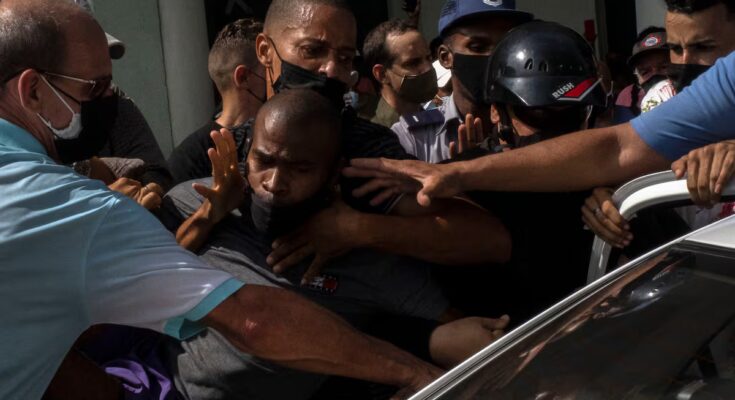The United Nations Working Group on Arbitrary Detention (GTDA) concluded that 49 participants in the unprecedented popular protests that took place in Cuba on 11 July 2021 – which automatically turned citizens into political prisoners – suffered arbitrary arrests, enforced disappearances, unfair trials and convictions, torture, isolation and discrimination on political and religious grounds. Four years after the demonstration, which ended with the imprisonment of over 1,500 people, Cubans and international organizations continue to demand justice. “It has been a long road, but every fair sentence is positive, even if it represents a small part of the reality that Cubans live,” Javier Larrondo, director of Prisoners Defenders, the NGO that documented and presented the cases to the Working Group, told EL PAÍS.
The United Nations’ opinions, presented during its 103rd session, show that some detainees were not informed of the reasons for their detention, had no arrest warrants issued, nor were they aware of their rights before the law. They also reflect that they were not brought before a judge to challenge their detention within 48 hours of their initial deprivation of liberty and that some, following their arrest, were held incommunicado for several days and weeks, without being allowed to communicate with their families. Furthermore, many cases did not have access to a lawyer nor were they presented before a judge “who would guarantee the legality of the process”.
“Given the context in which these arrests took place, the cases described in the communication highlight a systematic violation of multiple rights established in the Universal Declaration of Human Rights, in particular Article 18, which guarantees freedom of thought, conscience and religion,” the Working Group determined. He also insisted that criminal charges against protesters “are intended to coerce them for their views and political participation, as well as to discourage new protests in that area.”
Prisoners Defenders, together with a team of more than ten jurists, undertook the task of collecting and analyzing thousands of documents relating to the cases of 520 prisoners, out of a total of more than 1,180 political prisoners in Cuba. “However, the resources and standards of the Working Group made it complex to address them all and asked us to do it in phases, so of those 520 cases, 17 cases were adopted in 2024 and 49 in 2025,” explains Larrondo. “It is very easy for a dictatorial regime to detain, disappear, imprison and torture thousands of people. Proving the innocence of each of them is a herculean task. The UN Working Group has proven to be highly professional in its task, despite not having the resources to deal with barely a small number of the thousands of cases that occur every year in Cuba.”
The GTDA’s findings place Cuba as the first country in the world in the number of convictions for arbitrary detention since 2019, making it a “historic conviction” by the UN, according to Larrondo. “These indicators are important for the debate on Cuba, in Europe and in the democratic world, to be adequate. We must stop fantasizing, Cuba is not a left-wing regime, it is a totalitarian, criminal and fascist dictatorship”, he maintains.
The United Nations Organization not only declared the Cuban government’s way of proceeding “illegal”, widely denounced by activists, independent media and by the voices of relatives and prisoners themselves; It also urges the Havana government to release and compensate the 49 analyzed political prisoners and to grant them “other types of reparations, in accordance with international law”. He also urged the Cuban government to carry out an “exhaustive and independent” investigation into the reported cases and to “adopt relevant measures against those responsible for the violation of their rights.”
On March 7, 2015, the Working Group communicated the allegations to the Cuban Government and requested a response before May 6, requesting detailed information on the situation of some detainees. However, to date, Havana has not sent “any response within the deadline granted and has not requested an extension of this deadline.” “The Working Group regrets that the Government did not respond to its request within the expected deadline,” says the organization. Larrondo, for his part, insists that they will continue their work of denunciation, whether or not “politicians act to stop the massacre of freedoms taking place in Cuba.”



